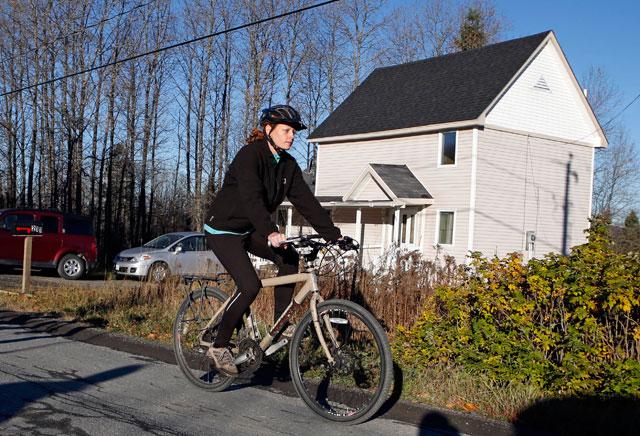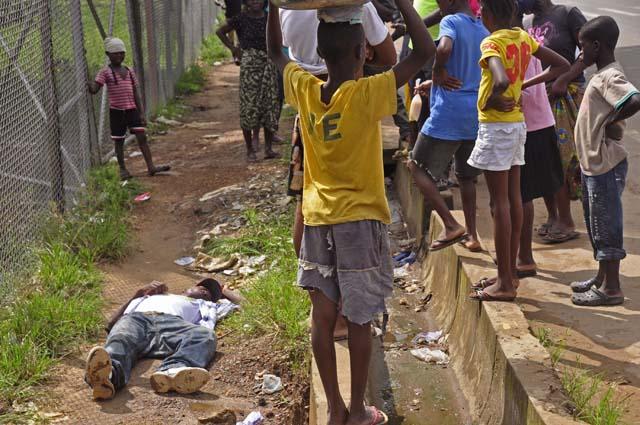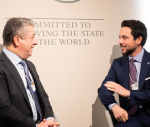You are here
Ebola: Danger in Sierra Leone, progress in Liberia
By AP - Oct 30,2014 - Last updated at Oct 30,2014

FREETOWN, Sierra Leone — Liberia is making some progress in containing the Ebola outbreak while the crisis in Sierra Leone is going to get worse, the top anti-Ebola officials in the two countries said.
The people of both countries must redouble efforts to stop the disease, which has infected more than 13,000 people and killed nearly 5,000, the officials said. Their assessments underscore that Ebola remains a constant threat until the outbreak is wiped out. It can appear to be on the wane, only to re-emerge in the same place or balloon elsewhere if people don't avoid touching Ebola patients or the bodies of those who succumb to the disease.
"We are in a crisis situation which is going to get worse," Palo Conteh said late Wednesday in the Sierra Leone capital, in his first press conference as head of the national ebola response centre. "What is happening now should have been done three months ago."
"Today we have a new and vicious enemy, an enemy that does not wear uniform, that... attacks anyone that comes into contact with [it] and if unchecked will ravage our beautiful land and its fine people," he said.
The stark warning and call to action was echoed by others, even in neighbouring Liberia, where the World Health Organisation (WHO) has said the rate of infection appears to be slowing, perhaps by as much by 25 per cent week over week.
"We need to re-galvanise our efforts, accelerate the interventions, remain vigilant," said Tolbert Nyenswah, the assistant minister of health who leads the Liberian government's Ebola response.
The WHO announcement has given Liberia a reason "to put our shoulders to the wheel so that Ebola can be something of the past", Deputy Information Minister Isaac Jackson told a news conference Thursday. "We are not going to relax."
WHO officials also urged caution in giving the news, saying the gains could be reversed.
But others went further. Alfred Brownell, an activist in Liberia, remembered the moment in the spring when Liberians thought the crisis was over, but then it got worse. Now he is bracing for another potential wave of cases, he said.
"The present epidemic is unpredictable: We have seen a lull in cases in one area only to see the numbers spike again later. More aid is needed on the ground. It's time now to step up contact tracing, safe body management practices and community surveillance," said Fasil Tezera, head of Doctors Without Border's mission in Liberia, even while noting that their 250-bed centre in the capital has only about 80 beds occupied.
Liberia is the hardest hit country in the Ebola outbreak sweeping West Africa that has also ravaged Guinea and Sierra Leone.
Still, there are some signs of hope. In Liberia, there has been a decrease in the number of patients seeking Ebola treatment, the number of bodies collected and the number of lab-confirmed cases, according to Nyenswah. In Sierra Leone, even though the outbreak is now hitting areas in and around the capital, the country's east has seen the disease wane.
"If people in other areas of the country copy the example of eastern Kailahun and Kenema Districts, then the spread of the disease will subside like in Kailahun and Kenema. As I speak, people [near the capital] are still touching people suspected with the Ebola disease, people are still burying corpses at night of those who have died of the disease," Conteh said.
With international assistance growing, Conteh said up to 700 beds would be set up in treatment centres and that the United Nations has four helicopters in the country. A British hospital ship docked in Freetown on Thursday.
The outbreak has taken a particularly high toll on health workers, sickening more than 520, and greatly reducing the health system's capacity to respond in the three most-affected countries.
The World Bank announced Thursday that it will give an additional $100 million to help bring in more foreign health workers. The new funds will be used to train, pay and house health workers while they're in the Ebola hot zone and provide medical care or evacuation for anyone infected.
"It is our hope that this $100 million can help be a catalyst for a rapid surge of health workers to the communities in dire need," Jim Yong Kim, the bank's president, said in a statement Thursday. He is visiting Ghana, where the UN mission on Ebola is based.
If the virus continues to surge in the worst-affected countries and spreads to neighbouring countries, the financial impact could reach $32.6 billion by the end of 2015, the bank has warned.
Related Articles
The World Health Organisation (WHO) said on Tuesday it had shut a laboratory in Sierra Leone after a health worker there was infected with Ebola, a move that may hamper efforts to boost the global response to the worst ever outbreak of the disease.
Liberia battled on Tuesday to halt the spread of the Ebola disease in its crowded, run-down oceanside capital Monrovia, recording the most new deaths as fatalities from the world's worst outbreak of the deadly virus rose above 1,200.
Sierra Leone said Saturday it will confine people to their homes in a nationwide three-day shutdown later this month aimed at containing the Ebola epidemic threatening west Africa.
















